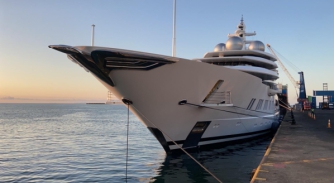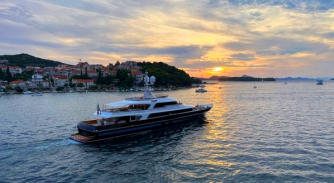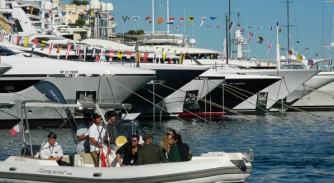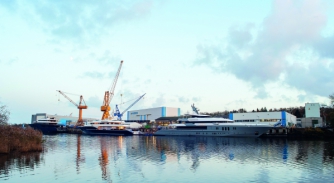Navigating contractual waters
Stephenson Harwood's Rebecca Crookenden and Ezio Dal Maso dissect the findings of the Winch v Somnio Superyachts ruling…

In this article, Rebecca Crookenden, Managing Associate and Ezio Dal Maso, Partner of law firm Stephenson Harwood examine a recent High Court decision that highlights the importance of clear contractual obligations in yacht design projects.
In the yachting and cruise industry it is not unusual for designers to start working for start-up companies and/or individuals who are in the process of developing their own project. It is common for these companies not to be incorporated at the outset or, even if they have been, for the founder to act as the owner of the project. The English High Court has recently decided a dispute (Winch Design Limited v Carl Le Souef & Somnio Superyachts Pty Limited1) between the developer of a residential yacht project and a designer, concerning unpaid invoices for design services.
The services were provided by a very well-known English design firm (the “Designer”) for a project to construct a highly exclusive, ultra-luxury residential yacht, which was to be one of the largest and most luxurious yachts ever built.
The Designer was engaged by an Australian entrepreneur (the “Project Developer”), and a special purpose vehicle (SPV) incorporated in Australia for the development of the yacht (the “Yacht Owning Company”). The Project Developer is the Yacht Owning Company’s sole director. The dispute arose over unpaid invoices for design services rendered by the Designer. The Yacht Owning Company was brought into the proceedings before the English Commercial Court as a Part 20 defendant (the First and Yacht Owning Company are referred to below collectively as the “Defendants”).
The dispute
The principal issues for the Court to determine were as follows:
Identity of the contracting parties
The primary issue was whether the contract was between the Designer and the Project Developer personally or between the Designer and the Yacht Owning Company. The contractual documents explicitly named the Project Developer as the “Client,” was signed “on behalf of [the Project Developer]”, and the Addendum to the contract referred to the agreement as being between the Project Developer and the Designer. The
Defendants argued that the Yacht Owning Company was the intended contracting party, seeking to rely on the wider factual matrix to make the implication (seeking to use the parole evidence rule).
Payment terms
The Court examined whether the sums invoiced by the Designer were due for payment. The Defendants argued that payment was contingent upon the Designer’s performance of the design services, while the Designer contended that the invoices were accrued debts.
Agreement to forbear seeking payment
The Defendants claimed that during a meeting on 22 October 2021, the Designer’s representative agreed to forbear from demanding payment of the invoices until the Yacht Owning Company secured third-party funding (effectively a variation of the underlying contract). This argument was put forward despite limited evidence and the underlying contract containing a clause preventing oral modifications. There was a related issue as to whether, notwithstanding the absence of a contractual variation, the Designer could nevertheless be estopped from demanding payment of the sums alleged pending the Yacht Owning Company’s adequate funding.
Performance of the contract
The Defendants counterclaimed that the Designer had breached the contract by failing to provide the design services and sought damages for the costs of procuring alternative suppliers and delays in the yacht’s construction. The Designer contended that the Defendants had not provided adequate particulars or evidence of the services alleged not to have been performed, and in any event, the Designer was entitled to suspend its services pending payment of sums due under its outstanding invoices.
The Court’s decision
The Court concluded that:
• The contract was between the Designer and the Project Developer personally, not the Yacht-Owning Company. Parole evidence was “admissible to clarify the meaning of a contract but not to contradict it, even on issues of identity.”
• The contract provided for payment on specific dates, independent of the completion of the services, and that the invoices were accrued debts under the terms of the contract Accordingly, the sums invoiced by the Designer were due for payment as accrued debts under the contract.
• There was no evidence of a forbearance agreement, nor were there contemporaneous documents that supported the Defendants’ account. In circumstances where there was no promise to forbear seeking payment, there could be no estoppel.
• The Designer was entitled to suspend its services due to non-payment, and there was no breach of contract by the Designer.
• The Defendants’ counterclaim for damages was unsupported by evidence and failed as a matter of law.
As a result, the Court ordered that the Project Developer was indebted to the Designer in the sum of the fees claimed, with interest, and dismissed the counterclaim.
This case highlights the Court’s approach to construing contractual terms. Where there are clear and unequivocal words, parties will not be able to depart from the meaning of those words by reference to extraneous evidence. The Court will always look to what a reasonable person with reasonable background knowledge would have understood the parties to have meant.
The full text of the judgment is available here.
Lessons learnt
To avoid any unintended consequences arising from the means by which initial instructions are given, it is important, when dealing with a new client or customer, for yacht designers to ensure, if there is any intention that a different party should be liable for contractual obligations, that this is expressly included in the terms of any contract.
Ideally, any additional party should be a counter signatory to that contract, designers may also wish to include provisions that make both/all counterparties jointly and severally liable for any sums due under the contract. This advice is similarly applicable to any commercial parties where they may have more than one contractual counterparty and/or entity to whom it might be arguable that obligations are owed.
NEW: Sign up for SuperyachtNewsweek!
Get the latest weekly news, in-depth reports, intelligence, and strategic insights, delivered directly from The Superyacht Group's editors and market analysts.
Stay at the forefront of the superyacht industry with SuperyachtNewsweek
Click here to become part of The Superyacht Group community, and join us in our mission to make this industry accessible to all, and prosperous for the long-term. We are offering access to the superyacht industry’s most comprehensive and longstanding archive of business-critical information, as well as a comprehensive, real-time superyacht fleet database, for just £10 per month, because we are One Industry with One Mission. Sign up here.
Related news

What’s next for Amadea?
The recent ruling may have provided some clarity on the UBO, but what happens now in a complex political climate offers more questions than answers
Opinion

Hill Dickinson and Alley Maass sign transatlantic partnership
Two of the industry’s leading law firms have signed an alliance to better serve clients in their respective jurisdictions amid growing market demand
Business

Millions in unpaid wages secured for crew
Crews recovered £2.17m in unpaid wages via Nautilus in 2024, bringing to the fore persistent challenges as union support in the sector increases
Crew

Another yacht on fire
The recent blaze near Marseille is just one of the latest in a spate of yacht fires. Philippa Langton, Partner, and Jessica Slater, Solicitor, in the
Opinion

Industry investors look to FSG Nobiskrug
Since filing for insolvency, the famous German shipyards have attracted some attention, with operations expected to fully resume by spring
Business
.jpeg)
No win, no Phi
Phi is but a “pawn of policy”, heard Supreme Court judges, while Captain Guy Booth discusses the next steps for the stranded superyacht
Fleet
Related news
What’s next for Amadea?
4 weeks ago
Millions in unpaid wages secured for crew
3 months ago
Another yacht on fire
3 months ago
Industry investors look to FSG Nobiskrug
3 months ago
No win, no Phi
3 months ago
NEW: Sign up for
SuperyachtNewsweek!
Get the latest weekly news, in-depth reports, intelligence, and strategic insights, delivered directly from The Superyacht Group's editors and market analysts.
Stay at the forefront of the superyacht industry with SuperyachtNewsweek



